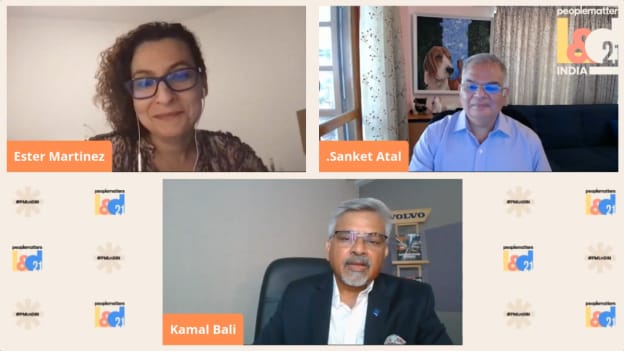CEO Conversation: Walking the tightrope between business needs and individual aspirations

Digital transformation, the rearrangement of global value chains, changing customer demands and expectations, the pressures of sustainability and inequity and a pandemic that seemingly won't go away. Amid all this, some might think that business needs and employee needs will clash – but they would be wrong, said panellists at People Matters L&D Conference 2021.
“I personally do not feel that business needs and individual aspirations should be at cross purposes,” said Kamal Bali, President & Managing Director at Volvo Group, India.
“It is not one at the cost of the other. If this is happening...there's something seriously wrong.”
He was speaking on a panel together with Sanket Atal, SVP and Managing Director - Sites at Salesforce, moderated by Ester Martinez, CEO & Editor in Chief at People Matters. The discussion highlighted a number of challenges and opportunities in today's learning landscape, along with valuable advice for navigating them.
Human distractions and new workforce needs
The L&D function today faces a variety of unique challenges that have very seldom, if ever, emerged in the workplace before. One is an increased attention deficiency among employees. Citing a Deloitte study that found that most learners won't watch videos longer than four minutes, Kamal said:
“Employees are getting distracted with millions of websites, apps, and video clips, employees are also becoming impatient, and some of them are feeling overwhelmed with what they're supposed to do.” On top of this, he added, more than two-thirds of employees have complained they don't have time to even complete their jobs – let alone make time to learn.
Another is the impact of remote and flexible work on company culture, which affects an organisation's ability to develop and maintain a learning-positive culture where people actively want to learn for improvement and not just to check a requirement.
“How do you inculcate the company culture when everybody is distributed?” asked Sanket. “There should be a new breed of courses designed for this: creating affinity and attachment with the company, using a structured online virtual experience to replace the organic workplace interactions.”
Mindset, culture, and approach must evolve
The conversation flagged out a need for L&D professionals to view their role more broadly and with an eye to the business perspective; to not just focus on the immediate needs of a role, but also on making employees capable of handling future needs.
“The key expectation is a mindset change from being just a training provider, to being the strategic learning partner with employees,” Kamal said. “The L&D organization needs a very strong business instinct to align the learning and capability building needs to the business strategy. I think that alignment is very, very crucial.”
What's more, he said, the L&D function must make programmes as available to employees as possible He identified four 'A's: Availability, Accessibility, Adaptability, and Affordability as being extremely important characteristics of any learning the programme.
This also involves design thinking – what Sanket described as thinking from your customers' perspective, being aware of what customers are doing and how they are going about their business, and shaping the product in the appropriate way.
“We need to understand what the people are going through and give it to them now,” he said, referring particularly to the shortened attention span of many learners today. “In the Tiktok generation, you have to have sound bites, small palatable pieces, and nuggets of information that people are able to consume.”
Some skills that will be crucial going forward
The discussion surfaced a few skills that the leaders thought would be particularly important for the near future and indeed, for the long term. These include:
- Storytelling
- Agility
- Self-management
- The ability to remain up to date with the current environment
- The ability to work across different fields of knowledge
Finally, there must be a general realisation at all levels that learning and skills of all kinds need not be separated into what the employee wants versus what the employer wants – they are two sides of the same coin.
“Organisations are like social enterprises, which has implications on how colleagues are engaged, including the humanisation of workplace by looking at employee health and well being, community involvement sustainability and the positive societal impact,” Kamal said.
“There is an employee value proposition, there is a company purpose, a higher purpose, and they need to be connected.”
In practice, this benefits everyone. Sanket said: “If you are able to engage the employee, provide the right opportunities to learn and at the same time, are able to inculcate the culture, then the company becomes more of a destination for a career rather than a stepping stone.”













